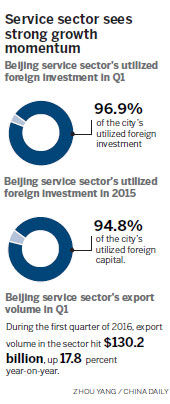

Beijing's service sector has contributed to the bulk of the city's utilized foreign investment, city officials said.
Statistics indicate that the sector absorbed $5.55 billion of foreign capital during the first quarter this year, accounting for 96.9 percent of the city's utilized foreign investment and 22.7 percent of China's total utilized foreign investment in the service sector during the period.
The rapid growth was spurred by the decision of the State Council in May 2015 to allow the city to further open up the sector, said Yan Ligang, director of Beijing Commission of Commerce.
"The China Beijing International Fair for Trade in Services, CIFTIS or the Beijing Fair, will showcase Beijing's accelerated efforts to open up its service industries," he said.
The fair is expected to attract many global visitors through its rising status and influence.
Statistics indicate that the rapid growth momentum from 2015 has continued into 2016.
Beijing's service sector absorbed $12.3 billion from foreign companies in 2015, accounting for 94.8 percent of the city's utilized foreign capital.
During the first quarter of 2016, export volume in the sector hit $130.2 billion, up 17.8 percent year-on-year.
The figure accounted for 29 percent of the city's total foreign trade during the period, 13.7 percentage points higher than the average nationwide growth figure.
"The sector's growth has motivated us to drive through further reforms and restructuring, which will continue to inspire international confidence, Yan said.
As well as its success in attracting foreign capital, the city's service sector has also made significant investment overseas.
During the first quarter, the direct investment overseas by Beijing's service sector hit $4.1 billion, 1.6 times higher than the figure for the same period in 2015, accounting for one-10th of the nation's total foreign investment.
Enterprises have benefited from the introduction of a range of new policies since the State Council's decision to boost Beijing's service industry.
"Under the decision, the city's government has implemented 85 pivotal measures on an experimental basis, which have paved the way for solid growth," Yan said.
The measures were introduced across a range of sectors, including high-tech, internet, culture, education, finance, tourism and healthcare, and there are plans to extend measures across more sectors.
The city has reduced red tape to speed up the business approval process and reformed its trade services.
For example, a foreign bonded zone where cultural products are sold was opened in Beijing last year, and it has facilitated fast and flexible product delivery.
In addition, third-party agencies have been authorized to facilitate cross-border renminbi transactions in the city.
Service and business administration and supervision measures for online companies have also been put in place.
yangcheng@chinadaily.com.cn
